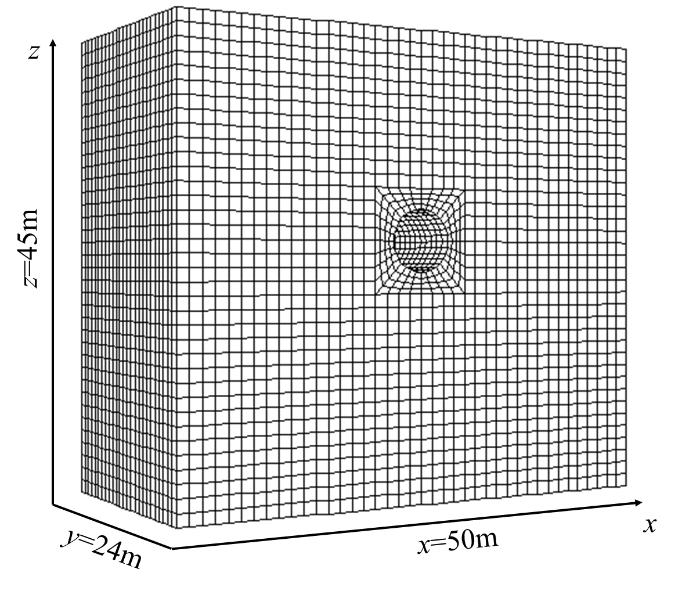基于伯格斯模型的隧道洞壁粘弹性位移分析毕业论文
2020-04-12 14:24:27
摘 要
在部分地质不良地区,隧道周围会出现软弱岩石。大量工程监测数据和室内试验表明,软岩变形具有流变性,即软岩变形会随时间增加而增加。软岩的流变变形会导致建筑物沉降增大,甚至引起隧道内部结构破坏,对隧道和周围建筑物的稳定性与安全产生不利影响。为减少软岩流变变形引起的安全事故,提高隧道的长期稳定性,在对隧道施工设计时需充分考虑岩石的流变特质。
本文在分析隧道的长期稳定性问题时,采用伯格斯流变模型,考虑开挖距离对隧道洞壁受力的影响,分别采用理论分析和数值模拟两种方法,得到隧道开挖后洞壁位移随时间变化的规律,同时分析了流变模型参数对洞壁位移和应力的影响。论文主要包含以下几个方面:
(1)基于伯格斯模型,通过损失因子考虑开挖距离对隧道洞壁受力的影响,推导了静水应力场下圆形隧道洞壁粘弹性位移的解析公式,得到的解析公式能够很好地反映岩石蠕变第一阶段和第二阶段的变形规律。
(2)采用位移控制法的分析思路,对某工程案例进行了数值模拟,得到了隧道上方地表土体沉降。通过与Loganathan解析公式对比,验证了位移控制法模拟隧道开挖的准确性与适用性。
(3)在位移控制法的基础上,利用有限差分软件FLAC3D和内嵌的Burgers模型,对已开挖隧道进行4000天的流变分析,得到了隧道洞壁位移随时间的变化规律,并验证了解析公式的正确性。
(4)基于有限差分软件FLAC3D,分别对伯格斯模型的四个流变物理参数进行参数分析,以得到流变物理参数对洞壁位移和应力的影响。结果表明:对于隧道洞壁位移,Maxwell粘滞系数对洞壁位移的影响较小,其余三个模型参数与洞壁位移成反比关系。对于隧道洞壁应力,Kelvin剪切模量和粘滞系数均与洞壁应力成反比关系,而改变Maxwell剪切模量和粘滞系数,对隧道洞壁应力的影响很小。
关键词:隧道;伯格斯模型;粘弹性位移;解析解;数值模拟
Abstract
In some bad geological areas, there are soft rocks surrounding the tunnel. Lots of engineering monitoring data and laboratory tests point out that, creep behavior exits in soft rock, which means that the deformation of rock increases with time increasing. And the creep behavior of soft rock will lead to large settlement of construction, even has negative influence on the stability and safety of constructions. In order to reduce the accident due to creep behavior of rock and improve the long-term stability of tunnel, creeping behavior of rock should be taken into full account in the construction design of tunnel.
In this thesis, the long-term stability problem of the tunnel was analyzed in the way of theoretical analysis and numerical simulation. Based on Burgers constitutive model and considering the influence of the tunnel face, the creeping displacement of tunnel wall after excavation and the analysis of the model parameters’ influence on the displacement and stress of the tunnel wall have been studied. The thesis mainly includes the following aspects:
(1) Considering the effects of tunnel by using the constraint loss factor and applying Burgers constitutive model, the analytic solution for the viscoelastic displacement of tunnel wall in circular tunnel under hydrostatic stress field was deduced. The analytic solution can consider the first stage and second stage of rock creep deformation well.
(2) According to Displacement Control Method(DCM), the numerical simulation of tunnel excavation was carried out based on an engineering case, and the result of ground settlement displacement was obtained. By comparing the numerical with Loganathan's analytical solution, the accuracy and applicability are verified.
(3) Based on DCM, the numerical solution analysis of tunnel considers a creeping time of 4000 days, by using finite difference software FLAC3D and Burgers constitutive model. The numerical solution shows the displacement of tunnel walls over time and proves the veracity of the analytic solution.
(4) The parameter analysis of four mechanical creeping parameters of Burgers model was implemented to investigate the influence of four mechanical creeping parameters on the displacement and stress of tunnel wall. The result shows that, Maxwell’s viscous coefficient has little influence on the tunnel wall displacement, and the other three parameters are inversely proportional to the tunnel wall displacement. On the other hand, Kelvin shear modulus and Kelvin viscosity coefficient are inversely proportional to the stress of the tunnel wall. At the same time, changing Maxwell shear modulus and Maxwell viscosity coefficient has little effect on the stress of tunnel wall.
Key Words:tunnel; Burger’s model; viscoelastic displacement; theoretical solution; numerical simulation
目 录
第一章 绪论 1
1.1 选题背景及意义 1
1.2 国内外研究现状 2
1.2.1 岩石流变模型的研究 2
1.2.2 隧道流变变形的研究 4
1.3 研究内容和技术路线 5
1.3.1 研究内容 5
1.3.2 技术路线 6
第二章 洞壁位移理论解 7
2.1 引言 7
2.2 理论分析假设和计算模型 7
2.2.1 基本假设 7
2.2.2 约束损失因子 7
2.2.3 计算模型 8
2.3 伯格斯模型 9
2.3.1 基本力学元件 9
2.3.2 本构方程 10
2.4 理论推导 11
2.4.1 近端截面 11
2.4.2 远端截面 14
2.5 本章小结 14
第三章 洞壁位移数值解 15
3.1 引言 15
3.2 位移控制法 15
3.2.1 间隙参数 15
3.2.2 边界位移收缩方式 16
3.2.3 计算思路 17
3.2.4 验证位移控制法 17
3.3 数值模拟 19
3.3.1 模型条件 19
3.3.2 与理论解对比 20
3.4 本章小结 20
第四章 伯格斯模型参数分析 22
4.1 引言 22
4.2 分析思路 22
4.3 对隧道洞壁位移的影响 23
4.3.1 不同Kelvin剪切模量 23
4.3.2 不同Maxwell剪切模量 24
4.3.3 不同Kelvin粘滞系数 25
4.3.4 不同Maxwell粘滞系数 26
4.4 对隧道洞壁应力的影响 27
4.5 本章小结 28
第五章 结论与展望 30
5.1 主要结论 30
5.2 研究展望 31
参考文献 32
以上是毕业论文大纲或资料介绍,该课题完整毕业论文、开题报告、任务书、程序设计、图纸设计等资料请添加微信获取,微信号:bysjorg。
相关图片展示:











